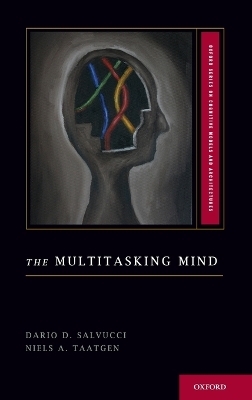
The Multitasking Mind
Oxford University Press Inc (Verlag)
978-0-19-973356-9 (ISBN)
This book presents the theory of threaded cognition, a theory that aims to explain the multitasking mind. The theory states that multitasking behavior can be expressed as cognitive threads-independent streams of thought that weave through the mind's processing resources to produce multitasking behavior, and sometimes experience conflicts to produce multitasking interference. Grounded in the ACT-R cognitive architecture, threaded cognition incorporates computational representations and mechanisms used to simulate and predict multitasking behavior and performance.
The book describes the implications of threaded cognition theory across three traditionally disparate domains: concurrent multitasking (doing multiple tasks at once), sequential multitasking (interrupting and resuming tasks), and multitask skill acquisition (learning and practicing multiple tasks). The work stresses the importance of unifying basic and applied research by alternating between in-depth descriptions of basic research phenomena and broader treatments of phenomena in applied domains, such as driver distraction and human-computer interaction. The book also includes practical guidelines for designers of interactive systems intended for multitasking contexts.
Dario D. Salvucci is an associate professor of computer science at Drexel University and holds a B.S.E. degree from Princeton University and a Ph.D. from Carnegie Mellon University. He has authored over 60 publications in the areas of cognitive science, human factors, and human-computer interaction, and has received several honors including the National Science Foundation CAREER Award. Niels A. Taatgen is a professor of artificial intelligence at the University of Groningen. He holds degrees in computer science and psychology, and has published in the areas of psychology and cognitive science. Until recently, he worked as a research psychologist at Carnegie Mellon University, collaborating with John Anderson and others on the ACT-R cognitive architecture project.
Preface
Contents
Chapter 1 A Unifying Theory of Multitasking
Chapter 2 Concurrent Multitasking and Threaded Cognition
Chapter 3 Driving and Driver Distraction
Chapter 4 Sequential Multitasking, Problem State, and Task Suspension and Resumption
Chapter 5 Task Interruption in Human-Computer Interaction
Chapter 6 Multitasking and Learning
Chapter 7 Complex Tasks and the Challenge of Monotasking
Chapter 8 Designing for Multitasking
Chapter 9 Reflections and Future Directions
References
| Erscheint lt. Verlag | 2.12.2010 |
|---|---|
| Reihe/Serie | Oxford Series on Cognitive Models and Architectures |
| Verlagsort | New York |
| Sprache | englisch |
| Maße | 241 x 165 mm |
| Gewicht | 587 g |
| Themenwelt | Geisteswissenschaften ► Psychologie ► Allgemeine Psychologie |
| Geisteswissenschaften ► Psychologie ► Verhaltenstherapie | |
| Wirtschaft | |
| ISBN-10 | 0-19-973356-2 / 0199733562 |
| ISBN-13 | 978-0-19-973356-9 / 9780199733569 |
| Zustand | Neuware |
| Informationen gemäß Produktsicherheitsverordnung (GPSR) | |
| Haben Sie eine Frage zum Produkt? |
aus dem Bereich


